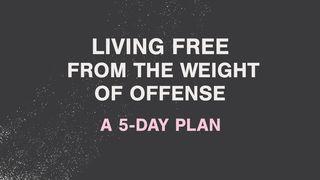Upside-Down Leadership: 30 Days to Lasting ImpactSample

Day 2: Let Your Guard Down
Yesterday, we established that true greatness is measured not by how high we climb, but by how low we're willing to go to serve others. Jesus was physically and socially low, assuming the servant role when He washed the disciples' feet. Whether we're talking about being physically low or lowering ourselves mentally, emotionally, and spiritually, "lowness" can be deeply uncomfortable for leaders.
Many of us have worked incredibly hard to get where we are—through years of education, climbing the corporate ladder, or building a platform through sweat equity and sacrifice. Our positions now come with authority, privileges, and perhaps even prestige. So the idea of lowering ourselves or letting our guard down can feel threatening. It feels backward (or upside-down). Maybe even wrong.
It's easy enough to agree with yesterday's example of doing a servant's task, but today's focus is more vulnerable.
Jesus—the all-powerful miracle worker, Son of God, and Messiah—shared His pain and opened His heart in Matthew 26:36-39. He said to Peter, James, and John:
“My soul is crushed with grief to the point of death. Stay here and keep watch with me.”
-Matthew 26:38 NLT
Let that sink in.
Jesus, our King, asked for emotional support. He invited His disciples into His grief.
This challenges our modern definitions of leadership.
Isn't vulnerability weakness?
You're not alone if the idea of being vulnerable makes you uneasy. Oxford Languages defines "vulnerable" as:
- Susceptible to physical or emotional attack or harm
- In need of special care, support, or protection
- Liable to higher penalties (my favorite)
Not exactly how most people would define a strong leader, right?
And yet… Jesus modeled this very thing.
That's because vulnerability isn't weakness; it's divine strength. Jesus was the perfect example of this paradox. He had nothing to prove, yet He chose transparency. He was fully God, yet He led like a servant. In doing so, He gave us permission—and a model—for authentic leadership.
Vulnerability builds spiritual leadership.
- People don't connect with perfection; they connect with authenticity. Jesus' disciples believed in Him for His miracles but loved Him for His humanity—His empathy, joy, and tears. Jesus brought His disciples along with Him, shared His angst, and asked them to "watch and pray" (Matthew 26:38-41 NLT) in His most distressed moment, demonstrating a leader who needed "care, support, or protection." He made Himself relatable, approachable, and real, fostering a strong bond with His followers.
- Vulnerability invites collaboration. On the one hand, admitting you don't have all the answers or sharing your feelings opens you up to criticism ("attack or harm"). Comments like "Shouldn't she know that if she's in charge?" and "He sounds weak!" are commonplace. On the other hand, acknowledging limitations or struggles opens the door for others to contribute, share ideas, or lend support, creating a more inclusive and empowered environment.
- Vulnerability builds trust and confidence. An inclusive and empowered environment develops engaged teams and family members. When leaders admit they don't have all the answers or acknowledge mistakes, they model honesty and humility. This signals to others: "It's safe to be real here."
- Vulnerability destroys "fear-based" cultures. There's a lot of goodness in feeling safe to be real, thrive, and make mistakes. In rigid, "invulnerable" environments, people tend to hide mistakes, hoard information, and avoid risk. Vulnerability shifts the culture to one that values learning, transparency, and growth.
Vulnerable leaders are strong leaders.
Yes, by definition, vulnerability implies exposure, but in the upside-down leadership model, that exposure is voluntary, intentional, and strategic. It exposes us to higher risks (or "penalties"), but isn't that where leaders should thrive?
We make risky decisions that expose us because those decisions are in the best interest of the team, family, or organization. The adage, "The bigger the risk, the bigger the potential reward," remains true. Christian leaders imitate Christ when they expose themselves to penalties for the greater good. Our sacrifices are needed for growth and will be worthwhile in the long run.
Let your guard down.
Lead with humility.
Trust that your transparency may be the very thing that transforms someone else's life.
Scripture
About this Plan

"Upside-Down Leadership" by author and U.S. Marine Olaolu Ogunyemi is a 30-day Bible plan that challenges conventional leadership. Through Scripture, stories, and practical insights, you'll learn to lead with humility, serve boldly, and leave a lasting legacy at home, work, or wherever you're called. Drawing from his "Lead Last" philosophy, Olaolu's guide will teach you to lead from the bottom up, just like Jesus.
More
We would like to thank Parent-Child-Connect for providing this plan. For more information, please visit: https://parent-child-connect.com









